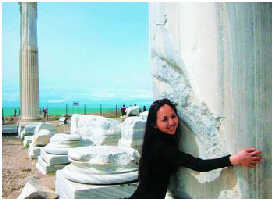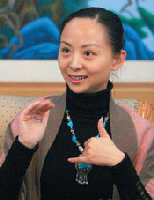 A Grateful Heart
A Grateful Heart
In 1994, Tai was admitted to the Hubei Fine Arts Institute as a student majoring in decoration and design. Her most loving piece is a canvas painting of ears and eyes. It's about a man standing in an abyss of darkness. She added ears and eyes and also the sun to it because disabled people always aspire for the colorful world. Sunshine brings life and hope.

Tai believes that life is never plain sailing. You can't choose goods and bads but you CAN pick a perspective and brave the adversity.
Tai is always frank and optimistic. If she could hear, she wouldn't get so much care from people around her perhaps, let alone achieve anything. It's the affection that has supported her all along, and so rather than regret, she has great satisfaction.
Living twenty years in a silent world, Tai Lihua doesn't bear a grudge. She retains a smile to the world and has made a miracle out of her disability. Every one knows her as an outgoing and optimistic character. It's such an attitude that prompts her to dance to her "music," narrating her beautiful story.

As Tai understands, the Thousand-handed Goddess of Mercy is kind-hearted and always willing to give a hand to people in difficulty. As the society shows concern and care, the disabled are reaching out with the deepest gratitude.
As a disabled dancer, Tai Lihua's pursuit of art never lacks hardship. With her gift and determination however, she will surely tide it over and bask in her silent world of splendor.
Interview of Tai Lihua
Q: Do you get any special pleasure from dancing?
A: Dancing is a part of my life. It makes my world more colorful.
Q: Isn't it extremely boring to remember all the beats when you dance?
A: For a deaf, yes. It's rather difficult to remember all the beats especially that of such a long and ever changing piece of music like The Thousand-handed Goddess of Mercy. But I have no other choice. Hard work pays.
Q: The countenance of the Goddess of Mercy is hard to grasp. How did you manage it?
A: Director Zhang gave me a lot of information including some illustrations about the Thousand-handed Goddess of Mercy. After reading them, I could dance with a kind of affection. The Goddess herself is kind hearted. Though we are deaf, we try to send this special love to all the people.
Q: What's on your mind when you were performing on the stage?
A: I didn't think much. Together with the other 20 dancers behind me, we tried to give the best performance.
Q: I know you love drawing. Does it help you in one way or another when you dance?
A: For me, dancing is the best way to express myself. It's the most beautiful language in the world. Painting is static while dancing is dynamic. I can always imagine the music I "hear" and draw it down on thepaper. Such a combination helps to improve my performance.
Q: A good dancer would direct a dance. If you are given a new piece of music, how could you direct it?
A: I need the help of a sign language teacher; otherwise I won't know the rise and fall of the tone. All the dances now are directed by the normal people. I want to create a special form for all the disabled to enjoy the fantastic dancing, that is to say, the blind could "watch", deaf and mute could "hear" and the crippled could "perform".
